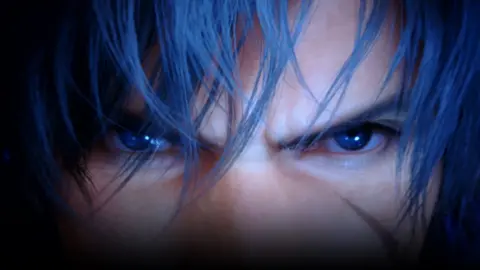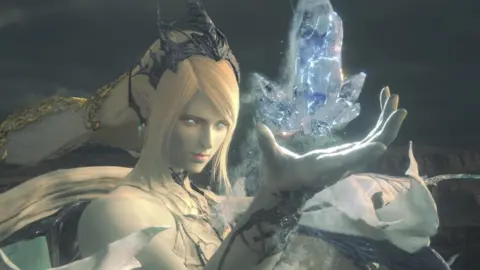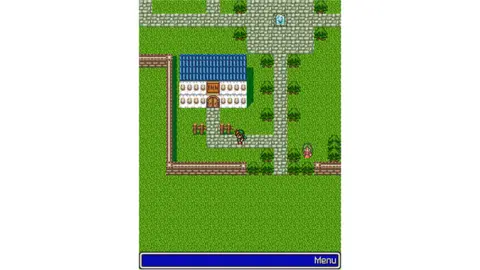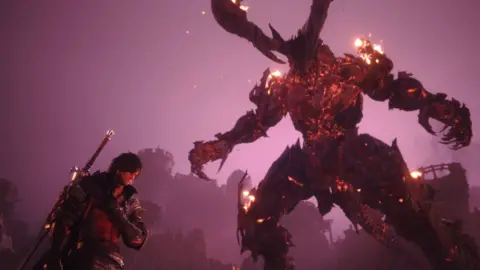Final Fantasy 16 producers on trying to regain fans' trust
 SQUARE ENIX
SQUARE ENIXExquisite hairstyles with not a tuft out of place, a band of loyal compatriots and more plot twists than Succession. Those are the ingredients that have made the Final Fantasy series stand the test of time.
However, after a mixed reception to the previous game, this latest release, which launched on Thursday, has some work to do.
Final Fantasy 16 producer Naoki Yoshida explains: "Because the Final Fantasy 15 story wasn't as well received as past titles, we needed to focus on regaining players' trust, and show them again that this series is all about the story."
That story, clearly inspired by fantasy shows like Game of Thrones, encourages players to think about looking after the planet better. A theme that has been present throughout the franchise's history.
How those messages are interpreted should be up to the player, although according to Naoki Yoshida: "I look at games as entertainment, I hope that through this entertainment players can take something away.
"Talking about the environment and those issues is also very important, but I think what Final Fantasy 16 also focuses on is that there is darkness in the world and darkness in ourselves. We have to accept that darkness to overcome it and move on to tomorrow.
"But I'm not in a position to say this is what players should feel, because everyone will take away something different. But if they do feel something then that makes us very proud and happy."
Most games stay clear of overt messaging on social or political issues so they don't alienate potential players who may hold differing opinions.
Aoife Wilson, who reviewed the title for Eurogamer YouTube Channel, says the series' ecological themes are plain to see: "I think generally in most Final Fantasy games when you boil it down the story is saying something about protecting the planet, and being wary of of mining it for selfish reasons.
"What I really like about 16, however, is that it tries harder than previous titles to say all that through a very human perspective."
 Square Enix
Square EnixThe first game, for the Nintendo Entertainment System, came out in 1987 and since then around 173 million copies of titles in the franchise have been sold.
An example of the Japanese roleplaying-game genre (JRPG), the series is unique because each title's setting is independent from each other (bar some small overlaps in places). Beloved characters, locations and worlds live and die in one game. It's as if The Sopranos swapped out Tony for a new character every series and ditched New Jersey for a different location.
It's a risky approach which asks players to forget their attachment to previous characters and invest emotionally in new ones each time. However the series is sticking with it.
According to Wilson, it's a way to try and keep the series current: "It means you don't have to have played six to be able to play seven, for example.
"They're all self contained, but they do share little similarities and have nods to previous games for fans as well. I often think that's the reason they have been so successful, the fact that the games are constantly having to reinvent themselves."
Final Fantasy games are not for everyone. They require patience and reward players for their investment. Attacks need to be learnt and mastered - bashing buttons at random will only take you so far in this franchise.
The scripts are over the top, some story arcs are a little traditional and Final Fantasy 15 was criticised for having four male characters as its primary focus. There is an attempt at more diversity this time around with a female character Jill in a central role, a queer relationship is featured however the main protagonists are still predominantly white.
With lots of competition in the role-playing game space at the moment (Legend of Zelda: Tears of the Kingdom and Hogwarts Legacy are this year's top selling games, for example), Final Fantasy 16 does have its work cut-out to attract players who aren't already fans of the series.
However, its tone, distinct aesthetic and enjoyable set-piece battles give it clear points of difference.
 Square Enix
Square EnixWilson says that this release is the first in the series for some time that she fells has a chance to cut-through: "When I was writing my review for Final Fantasy 16, I was asking myself 'who do I recommend this game to?'
"I think, interestingly, for the first time in a long time this is a title that I can recommend to pretty much anyone with an interest in games. I can do that without too many caveats or explainers and I think that's a very good sign for the series.
"Honestly with recent entries in the series it has been difficult to do that. Fifteen was fine, had some nice moments, but when it launched it didn't feel like a game that was finished. It had some of the right ingredients but it all didn't come together."
This version has a darker tone than previous entries. The departure will seek to make the series more appealing to new players, who will be more used to this feel than some of the gothic and modern mash-ups we've seen in the past.
 Square Enix
Square EnixA JRPG fan once told a friend about a classic of the genre that it "really comes into its own after about 80 hours of gameplay". Not everyone has the desire to stick with a game for that long before seeing the best of it.
Saying the same of Final Fantasy 16 isn't fair, however it is a title that requires some serious time investment to get the best out of it. The success of similar releases like Zelda, Elden Ring and Hogwarts Legacy recently suggests though that it should not be a barrier to success. Gamers' appetite for a title they love can easily stretch to a multi-hour investment for a story driven game like this.
Its creators hope that it won't only be fans of the series that are willing to go the distance.
Final Fantasy 16 is released on Thursday 22 June.
For more gaming content, go to Press X to Continue, the BBC Sounds gaming Podcast.

